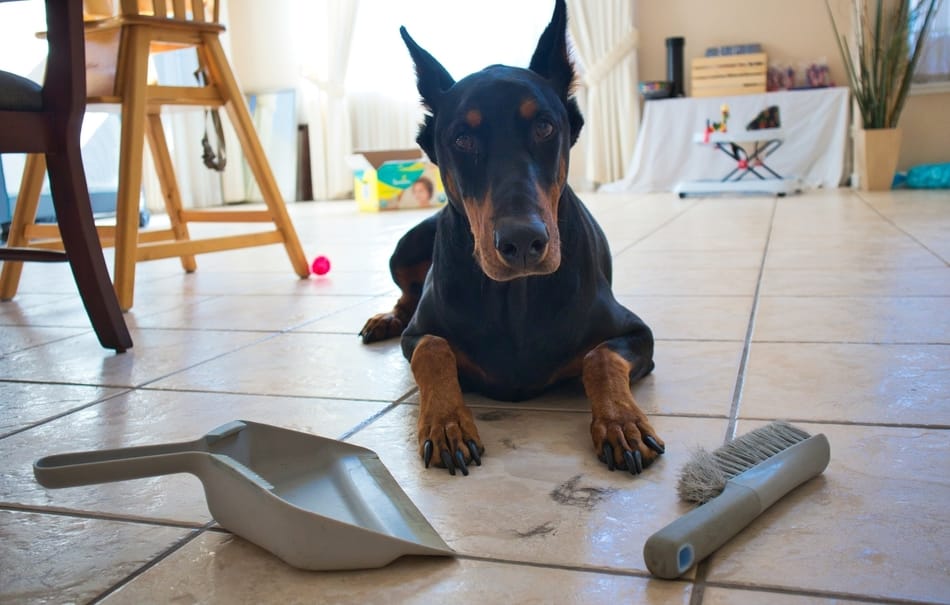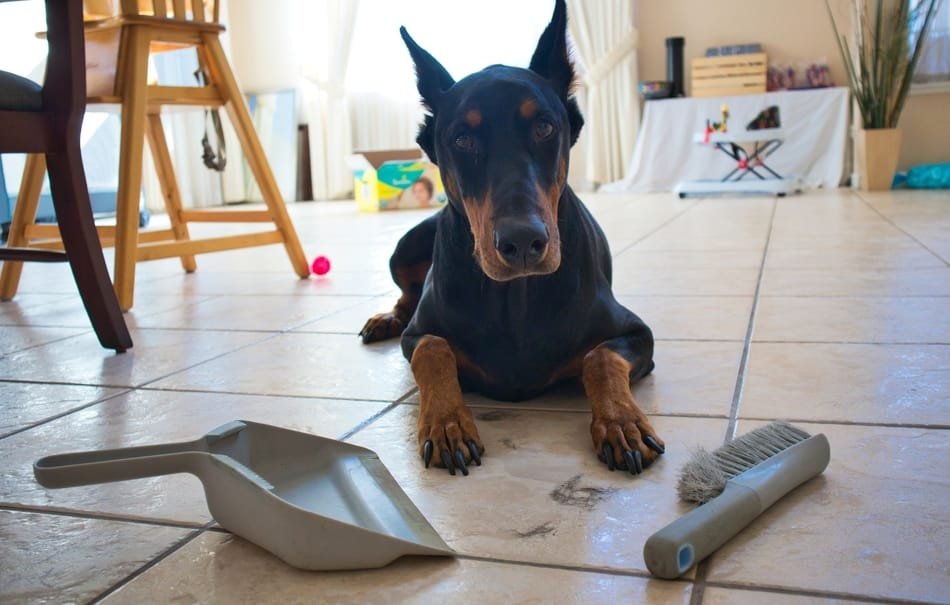Have you ever wondered why your Doberman is shedding so much? It can be quite alarming to see your furry friend leaving behind a trail of hair wherever they go, but there’s usually a reason behind it. Shedding is a natural process for dogs, including Dobermans, and it serves as a way for them to get rid of old or damaged hair. However, excessive shedding may indicate an underlying issue that needs to be addressed.
Dobermans are known to have a short, dense coat that requires minimal maintenance. However, various factors can contribute to excessive shedding in this breed. One possible reason is seasonal shedding, where Dobermans shed more during certain times of the year. Another factor may be poor nutrition or a nutrient deficiency, which can affect the health of their coat. Additionally, stress, allergies, or underlying medical conditions can also cause increased shedding. It’s important to identify the root cause and take appropriate measures to ensure the health and well-being of your Doberman.
Dobermans shed heavily due to their short, dense coats. Regular grooming is essential to manage their shedding. Brush your Doberman daily to remove loose fur and promote a healthy coat. Make sure to feed them a balanced diet rich in omega-3 fatty acids to support skin and coat health. Keeping your Doberman well-hydrated also helps minimize shedding. If shedding becomes excessive or you notice other signs of skin issues, consult with a veterinarian to rule out any underlying health conditions.

Why is my Doberman shedding so much?
Do you find yourself constantly vacuuming up dog hair from your Doberman? If you’re wondering why your Doberman is shedding so much, you’re not alone. Excessive shedding can be a cause for concern for dog owners, and in this article, we will explore the reasons behind why your Doberman is shedding so much. Shedding is a natural process for dogs, but when it becomes excessive, it may indicate an underlying issue that needs attention. Let’s dive into the details and find out why your Doberman is shedding excessively.
1. Seasonal shedding
One common reason why Dobermans shed heavily is due to seasonal shedding. Dobermans have a short coat, but they still have hair that grows and falls out in cycles. During certain times of the year, especially in spring and fall, Dobermans may shed more to prepare for the changing weather. This shedding helps them get rid of their thicker winter coat or grow a new one for colder months. Seasonal shedding is a normal process and is not a cause for concern.
To manage seasonal shedding, it is important to regularly brush your Doberman to remove loose hair before it ends up all over your furniture and clothes. Using a de-shedding tool or brush can help reduce shedding and keep your Doberman’s coat healthy.
2. Stress or anxiety
Just like humans, dogs can experience stress and anxiety, which can trigger excessive shedding. If your Doberman has gone through a major life change, such as moving to a new house, the addition of a new pet or family member, or any other stressful event, it can lead to increased shedding. Dogs may also shed more when they are anxious or nervous.
If you suspect that stress or anxiety is the cause of your Doberman’s excessive shedding, it is important to address the underlying issue. Provide your dog with a calm and secure environment, engage in regular exercise and play, and consider consulting with a veterinarian or a professional dog trainer to help manage your Doberman’s anxiety.
3. Poor nutrition
The quality of your Doberman’s diet can also play a role in their shedding patterns. If your Doberman is not receiving proper nutrition or if their diet lacks essential nutrients like fatty acids, vitamins, and minerals, it can result in dull and dry coat, leading to excessive shedding. It is important to feed your Doberman a balanced and high-quality diet that meets their nutritional needs.
4. Underlying health issues
In some cases, excessive shedding in Dobermans can be a sign of an underlying health issue. Health conditions like allergies, thyroid problems, infections, or hormonal imbalances can cause changes in the coat and lead to increased shedding. If you’ve ruled out other factors and your Doberman’s shedding continues to be excessive, it is important to consult with a veterinarian. They can perform a thorough examination, run tests if necessary, and determine if there are any underlying health issues that need to be addressed.
5. Lack of grooming
Regular grooming is essential for controlling shedding in Dobermans. If your Doberman is not groomed properly, it can lead to excessive shedding. Brushing your Doberman’s coat regularly helps remove loose hair and prevents it from ending up all over your home. Additionally, regular bathing, nail trimming, and ear cleaning are important parts of grooming that contribute to a healthy coat.
Remember to use grooming products that are suitable for your Doberman’s specific coat type and consult with a professional groomer if needed.
Why is it important to address excessive shedding?
Excessive shedding in Dobermans can be a sign of an underlying issue that needs attention. Addressing the cause of excessive shedding can help improve your Doberman’s overall health and well-being. It can also prevent your home from being covered in dog hair and reduce the risk of allergies and health issues caused by excessive shedding.
By understanding the reasons behind your Doberman’s shedding and taking appropriate measures, you can ensure a healthier and happier life for your furry friend.
Key Takeaways: Why is My Doberman Shedding So Much?
1. Shedding is a natural process for Dobermans to get rid of old or damaged hair.
2. Hormonal imbalances and health issues can cause excessive shedding in Dobermans.
3. Nutritional deficiencies can lead to increased shedding in Dobermans.
4. Environmental factors like temperature and stress can affect the shedding in Dobermans.
5. Regular grooming, a balanced diet, and a stress-free environment can help reduce excessive shedding in Dobermans.
Frequently Asked Questions
Dobermans are beautiful and majestic dogs, but they can be prone to shedding. If you’re wondering why your Doberman is shedding so much, you’re not alone. Shedding can be influenced by various factors such as genetics, environment, and overall health. In this article, we’ll address some common questions regarding excessive shedding in Dobermans and provide helpful answers to assist you in managing your dog’s shedding.
1. What are the common reasons for excessive shedding in Dobermans?
Excessive shedding in Dobermans can have multiple causes. One common reason is the seasonal shedding cycle, where Dobermans shed their old fur to make way for new growth. Another possible reason is stress or anxiety, which can trigger increased shedding. Poor nutrition and certain health conditions such as allergies or hormonal imbalances can also contribute to excessive shedding. It’s essential to identify the underlying cause to effectively manage your Doberman’s shedding.
Additionally, certain medications, allergies to grooming products, and changes in the environment, such as moving to a new home or a change in climate, can also lead to increased shedding. Regular grooming, a balanced diet, and addressing any underlying health issues are crucial in reducing excessive shedding in Dobermans.
2. How can I reduce excessive shedding in my Doberman?
To reduce excessive shedding in your Doberman, there are several steps you can take:
1. Regular grooming: Brush your Doberman’s coat at least once a week to remove loose hair and prevent it from spreading around your home.
2. Balanced diet: Ensure your Doberman is receiving a high-quality, nutrient-rich diet to support healthy skin and coat.
3. Address underlying health issues: If your Doberman is shedding excessively, consult with a veterinarian to rule out any underlying health conditions and receive appropriate treatment if necessary.
4. Create a stress-free environment: Minimize stress and anxiety for your Doberman by providing a calm and stable environment. Provide regular exercise, mental stimulation, and a routine that your dog can rely on.
3. Is there a specific season when Dobermans shed the most?
Yes, Dobermans typically experience more shedding during seasonal changes. They have a short, dense coat that helps regulate body temperature. As the seasons change, Dobermans shed their old fur to prepare for temperature adaptation. Spring and fall are the primary seasons when Dobermans shed the most. During these times, regular brushing and grooming can help manage the shedding and keep your Doberman’s coat healthy.
4. Can diet affect my Doberman’s shedding?
Yes, diet plays a crucial role in your Doberman’s overall health, including their coat condition and shedding. A balanced diet with high-quality protein, essential fatty acids, and adequate vitamins and minerals is essential for healthy skin and coat. Nutritional deficiencies can lead to dry, flaky skin and increased shedding. Consult with your veterinarian to ensure your Doberman is on a suitable diet and receiving all the necessary nutrients to minimize shedding.
5. When should I be concerned about my Doberman’s shedding?
While shedding is a normal part of a Doberman’s life, excessive shedding can be a cause for concern. If you notice significant hair loss, bald patches, redness, inflammation, or other signs of skin irritation, it’s important to consult with a veterinarian. These symptoms can indicate underlying health issues or allergies that require prompt attention. Regular veterinary check-ups and open communication with your vet are vital in maintaining your Doberman’s overall health and managing shedding effectively.

To understand why your Doberman is shedding so much, it’s important to know that shedding is a normal part of a dog’s life cycle. Dogs, including Dobermans, shed their old fur to make way for new hair growth. However, excessive shedding can be a cause for concern and may have various underlying reasons.
One possible reason for excessive shedding in Dobermans is poor nutrition. If your dog’s diet lacks essential nutrients, it can negatively affect their coat health. Another factor could be seasonal shedding, where dogs shed more during certain times of the year. Stress, allergies, hormonal imbalances, or underlying health conditions could also contribute to excessive shedding. If you’re concerned, it’s best to consult with a veterinarian who can determine the underlying cause and provide appropriate treatment or advice.
